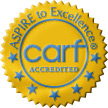The Pediatric Rehabilitation Medicine (PRM) Fellowship Program at Johns Hopkins/Kennedy Krieger offers one- and two-year programs, depending on the trainee’s previous experience and qualifications needed to be board certified in pediatric rehabilitation.
The fellowship program is accredited by the Accreditation Council for Graduate Medical Education (ACGME).
Facilities
Kennedy Krieger Institute operates a 50-bed pediatric rehabilitation hospital accredited by The Joint Commission (TJC) and Commission on Accreditation of Rehabilitation Facilities (CARF).
The Kennedy Krieger Pediatric Rehabilitation Continuum of Care also includes many outpatient clinics, a day hospital program, and a consultation service at the Johns Hopkins’ Bloomberg Children’s Center.

Five programs in the Pediatric Rehabilitation Continuum have the CARF seal of approval – inpatient rehabilitation, inpatient brain injury, inpatient spinal cord injury, outpatient spinal cord injury and community reintegration for brain injury.
Inpatient Rehabilitation Program
Although most of our patients are referred from the Bloomberg Children’s Center and the University of Maryland Children’s Hospital, we treat many patients from regional, national, and international medical centers.
The average daily census on the inpatient rehabilitation unit is 20. This includes on average seven brain injury, four spinal cord injury, five post orthopedic surgery and four medical rehabilitation patients. Up to four ventilator-dependent patients are treated on the unit at one time. An additional five beds are used by the inpatient feeding program and 16 beds are occupied by patients on the neurobehavioral unit.
Medical direction is provided by two full-time pediatric hospitalists. Consultation from all pediatric subspecialties is available.
Outpatient Programs
PRM fellows follow their own patients in weekly pediatric rehabilitation clinics. They also see patients in a wide variety of subspecialty clinics according to a monthly schedule. This exposes them to many different disorders that benefit from pediatric rehabilitation care and challenges them to apply their knowledge to unique situations.
We use an interdisciplinary team approach in many of our outpatient programs. PRM fellows learn about the contributions of other disciplines (e.g., neuropsychology, behavior psychology, education) and learn to manage a rehabilitation team in this dynamic environment.
Outpatient clinical experience is provided in the following areas:
- Brachial plexus injury
- Burns
- Cerebral palsy
- Chronic pain
- Concussion
- Down syndrome
- Epilepsy
- Hemiplegia
- Leukodystrophies
- Limb Differences
- Muscular dystrophy and other muscle disorders
- Orthopedics
- Osteogenesis imperfecta
- Selective dorsal rhizotomy
- Plagiocephaly
- Rett syndrome
- Spina bifida
- Spinal cord injury
- Sports medicine
- Sturge-Weber syndrome (SWS)
- Traumatic brain injury
- Wheelchair and Seating
Procedural Training
Fellows are trained in procedures that facilitate functional outcomes. These include botulinum toxin injections, EMG signal amplification for muscle localization, and ultrasound guided injections. They participate in baclofen pump refills and learn to troubleshoot pump malfunctioning. Fellows learn to interpret the results of pediatric EMG and nerve conduction studies at Johns Hopkins under the guidance of a senior member of the Child Neurology faculty. Opportunities are also available to learn to perform and interpret urodynamic testing and intraoperative monitoring.
Mentorship
Faculty from the Johns Hopkins Department of Physical Medicine and Rehabilitation and Kennedy Krieger Institute provide mentorship. The core faculty includes four physicians trained in pediatric rehabilitation medicine, three trained in adult PMR specializing in spinal cord injury, two pediatric hospitalists, and one neuropsychologist with expertise in biostatistics. Associate faculty at Kennedy Krieger includes neurologists, developmental pediatricians, orthopedic surgeons, research neuroscientists, physical therapists, and occupational therapists who can provide mentorship based on the interests of the trainee.
Each fellow will participate in a scholarly project and will work directly with a faculty member on a fellow-initiated project or one in which the faculty member is already involved.
